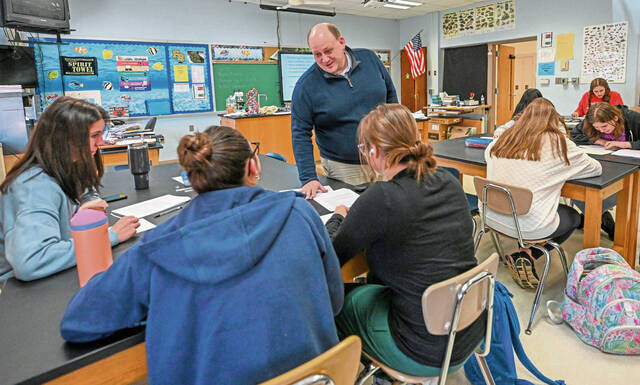https://development.triblive.com/news/western-pa-educators-eye-shapiros-proposed-cyber-tuition-rate-caps/
Public schools embrace Shapiro plan to cut $378M in cyber tuition costs

Gov. Josh Shapiro is proposing unprecedented funding for Pennsylvania’s K-12 public schools, including $526 million in supplemental funding for poor districts, $125 million to help pay for building projects and $111 million to support student mental health and safety.
Jeannette City School District Superintendent Matthew Jones said he’s most interested in Shapiro’s attempt to limit districts’ cyber tuition expenses.
The $8.2 billion education funding proposal sets a flat cyber tuition rate of $8,000 per student annually, capping the cost districts have to pay for students in their area to attend independent public cyber schools.
Cyber tuition for special education students could still exceed that rate, according to Emily Roderick, Shapiro’s director of press operations.
This could be a step in the right direction for Jeannette, a low-income school district whose budget is often weighed down by cyber tuition payments.
“Some of the major concerns that I have every year balancing our budget here in Jeannette could easily be resolved if we had a base number that we are working with,” Jones said. “Unfortunately, we haven’t had that.”
Jeannette is paying about $1.6 million in cyber school tuition this academic year, Jones said. That accounts for about 6% of the district’s $24 million spending plan for 2024-25.
Annual cyber school tuition rates across the state range from about $7,600 per student to nearly $29,000 per student, Roderick said.
Shapiro’s office estimated setting a flat cyber tuition cost will save the state’s school districts $378 million a year.
Districts encouraged
Highlands Superintendent Monique Mawhinney said school districts such as hers have requested a flat cyber tuition rate for years.
“Ensuring tuition costs align with the actual expenses of providing an online education is critical and will save our district thousands of dollars a year,” Mawhinney said via email.
Highlands adopted a $53 million spending plan for the 2024-25 school year, 63% of which is directed to employee salaries and benefits. Cyber school tuition, transportation, supplies and technology leases are other notable expenses, according to business manager Paul Paradise.
Paradise and Mawhinney did not respond to phone calls and emails requesting the district’s 2024-25 cyber tuition payment.
New Kensington-Arnold is paying about $2.7 million for cyber tuition this academic year, according to Jeff McVey, director of administrative services. This makes up more than 5% of the district’s $47.6 million budget for 2024-25.
Cyber tuition costs have made it next to impossible for the district to afford upgrades to its nearly century-old elementary schools, Martin and H.D. Berkey, said Superintendent Chris Sefcheck.
“We’re barely able to maintain a balanced budget and can’t afford a bond issue to upgrade facilities or build a new building,” Sefcheck said. “We just can’t do it. We don’t have the income.”
Budget aims to equitably fund schools
Education makes up about 16% of Shapiro’s $51.5 billion proposed state budget. The spending plan would increase the state’s education funding for next school year by 0.9%.
Most of the proposal’s new education dollars are aimed at more equitably funding school districts. About $526 million could support the state’s so-called adequacy formula — brought on by a February 2023 court ruling that deemed the state’s education funding system unconstitutional.
The PA Education Law Center and Public Interest Law Center filed a lawsuit against the state on behalf of six school districts, two statewide associations and several parents in November 2014, arguing the state’s formula for funding public schools violated the state constitution.
The case went to trial in 2021. A verdict was reached two years later.
Sefcheck has mixed feelings about the adequacy formula funding.
“My first reaction is positive,” he said, “however, I question whether the equity funds are going to be placed in the Ready to Learn block grant again or not, because that limits what we can use the money for.”
The $526 million allocated through the formula in the 2024-25 budget went to the Ready to Learn block grant program.
Potential uses include programs that improve academic performance, continuing professional education for teachers, physical and mental health services, disability inclusion and paying rising charter school tuition costs.
Sefcheck would rather see the adequacy formula dollars directed to the state’s basic education fund.
“We can’t get involved in bringing in programs and employees (with Ready to Learn funding) if we don’t know that it’s something that’s going to be sustainable,” he said.
But Sefcheck said the adequacy formula funding would come at an ideal time.
Covid relief money received during the pandemic has dried up, but the district would be able to continue paying its four mental health counselors with adequacy formula dollars.
Shapiro visited Highlands in September to highlight the state’s 2024-25 education investments, including a 10% — or $715,000 — increase to the district’s state funding from the adequacy formula.
Highlands received $19 million in state funding this academic year, Shapiro said.
“Highlands School District will benefit from this and use the funds to enhance our students’ academic, social and emotional well-being,” Mawhinney said.
Jones was encouraged by the proposed allocation to the adequacy formula.
“Certainly, I’d rather have a number like that than the other way around,” he said.
But Jones still has concerns about how the $526 million will be distributed.
“This is a long, arduous process between now and a final budget adoption in June,” Jones said. “That lack of predictability, it creates some frustrations, because we as school administrators, we’re planning for the fall right now and we’re looking at projects and we’re looking at services we can provide students.
“Without that predictability, it makes it a little bit more difficult.”
Special education targeted
The proposed budget also includes a $40 million increase in special education spending, which would bring total funding to more than $1.5 billion.
This caught the attention of Jason Conway, executive director of the Westmoreland Intermediate Unit. He said the $40 million increase is a positive sign for special education programs in Westmoreland County’s 17 school districts.
“The general support of special education by our state is a critical component to our districts,” Conway said. “Any increase is always supported to get it close to where it should be.”
Building maintenance costs, staffing and filling specialty positions — such as English as a second language and teaching students with hearing or vision impairments — pose additional pressures to Westmoreland County schools, Conway said.
The proposal could bump the state’s schools repair budget from $100 million to $125 million and dole out $40 million to the state’s student teacher stipend fund — which is meant to reduce barriers to earning a teaching certification.
Shapiro signed off on the stipend program in December 2023, allotting $10 million to support college students spending a semester student teaching this academic year. The 2024-25 state budget, passed in July, funneled an additional $20 million to the program.
“I think it’s safe to say that staffing is an issue across the commonwealth. The need for education paraprofessionals is a great need,” Conway said. “When you get into the specialty areas … we just do not have people going into those fields to become teachers.”
Nearly 2,500 teaching positions were vacant in Pennsylvania classrooms as of October, according to data released by the state.
A December 2023 amendment to the school code enabled the state Department of Education to collect and release teacher vacancy data for the first time. The October 2023 report revealed 2,156 vacant teaching positions.
About 46% of teacher vacancies stem from the special education sector, Penn State professor Ed Fuller told TribLive in June.
Copyright ©2026— Trib Total Media, LLC (TribLIVE.com)
